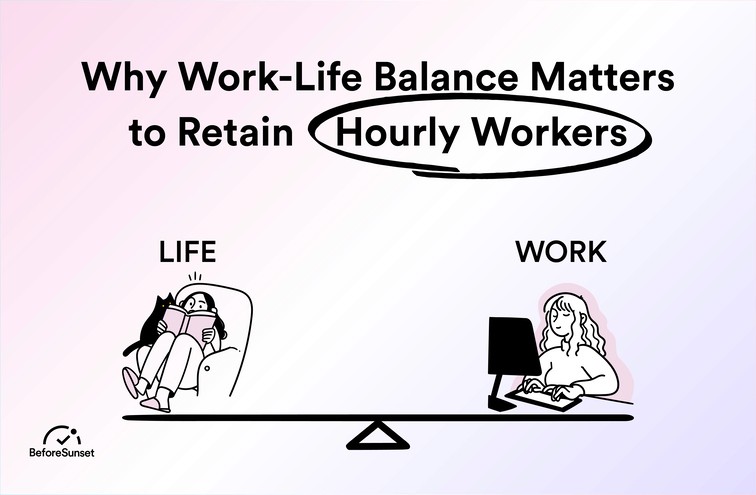Do you feel like you are trapped in an unhealthy work-life balance? Don’t worry, you are not alone. Once upon a time, the line between work and life was fairly clear. But today, it is nearly impossible to draw a clear-cut separation between your work and life, for work may invade your personal life.
Today’s labor market creates challenges for many, but especially for hourly workers. According to the United States Department of Labor, hourly workers make up around 60% of the U.S. workforce, which is close to 82 million individuals.
A survey from Shiftboard and Lux Insights shows the meaning of work for hourly workers, how hourly workers feel about job satisfaction, what matters most to them when it comes to a job, and more. According to this survey, 77% of hourly workers stated that work and life balance was a necessary factor to feel very satisfied with their job, surpassing the factor of being paid well which was 66 percent. As seen, work-life balance is the top factor for job satisfaction for hourly workers and this shows why it matters the most to retain hourly workers. So, let’s understand what work-life balance is.
You may also like:

What is Work-Life Balance?
Work-life balance is the balance between your professional and personal life while minimizing the work-related stress and maintaining your general well-being and being productive. In other words, blending the work and personal life in a harmonious way. A good work-life balance has numerous positive effects including less stress, a lower risk of burnout and greater sense of well-being. But if the balance is not achieved, it creates problems both for the employee and the employer.
What's more, the study found that nearly half of hourly workers would leave their current job if it meant working less than 40 hours per week. So why is work-life balance so important?
Why Does Work-Life Balance Matter for Hourly Workers?
With constant access to work, creating a work-life balance is more important and harder than ever. That being said, working for too many hours affects one’s physical and psychological health. That is why it is important to create a balance between work and life. By creating this balance, employers can achieve increased engagement and commitment levels and also see an increase in employee accountability and employee satisfaction while also reducing staff turnover and recruitment costs. And a work-life balance benefits the business, the employer, and the employee. A balance creates a better environment for teamwork, boosts employee productivity, and lowers absenteeism.
How to Achieve Work-Life Balance Best for Hourly Workers?
A good work-life balance means something different to every individual. For some, it might mean spending more time with family. For others, it could mean having the flexibility to pursue a passion outside of work. Whatever your definition is, you deserve an employer who respects your time and supports your efforts to achieve a healthy work-life balance.
Here are some useful tips to help you achieve a work-life balance:
1. Let Go of Being a Perfectionist:

According to Marilyn Puder-York, PhD, the key to avoiding burning out is to let go of perfectionism. Even though having an extremely productive day at work and spending quality time with your loved ones everyday sounds great, this is not always possible. Some days you want to be your most productive at work, but some days you may not have the energy to be. So, it is important to strive for a realistic schedule rather than a perfect one.
2. Unplug:
Technology has been in our lives for some time now. Even though it has helped in so many areas of our lives, it has also created expectations of constant accessibility. Sometimes we should cut our ties with the outside world to give ourselves some stress-free space.
Unplugging can be something like doing a fifteen-minute meditation or taking a two-week vacation. According to the State of American Vacation 2018 study conducted by the U.S. Travel Association, 52% of the employees have unused vacation days left over at the end of the year, fearing that taking time off will cause them have a backlog of work when they return. This fear should not restrict you from taking a break to prevent possible burnouts.
3. Prioritize Your Health:
Maintaining your physical health and emotional well-being should be your main concern in your life. “Prioritizing your health will make you a better employee and person.” says Heather Monahan, founder of the career mentoring group, #BossinHeels. “You will miss less work, and when you are there, you will be happier and more productive.”
4. Make More Time for Yourself and Your Loved Ones:

Even though your job is important and keeps you busy, remember that work-life balance is the key to self-care. Your job is not your entire life and that is why you should devote some quality time to yourself and your loved ones. Take a long walk, have a fika with your friend, go on a date with your partner. Whatever you do, you do it while you don’t have work in mind
5. Set Goals and Stick to Them:
We’ve mentioned the importance of not being a perfectionist. It is important to set achievable schedules and goals. And to set achievable goals, you should implement time-management strategies.
6. Ask for Flexibility:
According to Deloitte Millennial Survey 2018, flexible workplaces are required factors for millennials and Gen Z employees when considering staying with an employer. That being said, don’t hesitate to have open conversations with your employer as these conversations can lead to productive solutions. And remember, quality is the metric that matters the most!
Aside from the above, there are many other things for an employee to achieve work-life balance such as finding a job you love, setting boundaries and work hours, limiting time wasting activities and people, and many more.

Now, let’s talk about what an employer can do to help employees have a good work-life balance. If you are an employer and you want productive employees and better the working relationships , you should give them a chance to relax. Work-life balance boosts employees’ overall creativity. Here are some tips for employers:
1. Be a Model of Balance as an Employer:
It is essential to practice what you preach. As an employer, you should be an example for your employees. It is not healthy for you to work non-stop, either. By taking breaks, you can show your employees that it is okay and necessary to come up for air.
2. Make Time off Actually Time Off:
Simply respect your employees’ off-times. Don’t text, call or schedule meetings before or after work hours. While encouraging your employees to end work hours at a designated time, don’t forget to check in with anyone you notice consistently working after-hours.
3. Improve Your Employees’ Physical and Mental Health:
As a result, we can understand that employees’ physical and mental health play a major role in their productivity, engagement at work and overall well-being. As an employer, you should promote healthy habits and a better work-life balance to help them have a stress-free work experience as stress is one of the biggest threats to employee well-being along with burnout.
4. Offer Flexible Schedules and Consider Telecommuting:
As an employer, you shouldn’t be bothered that your employees won’t be productive while working from home, which is a complete myth. Telecommuting is a great opportunity to give your employees a better work-life balance while helping them avoid a costly commute.
And by creating a flexible schedule, you can help your employees decide when they will start and end their typical workday. This does not mean that they get to have a right to not showing up to work, but they get to choose what time they start each day. This way, they can choose the work hours according to the hours when they feel most productive.
5. Tune in to Your Employees’ Needs:
It takes listening to your employees to create a healthy work-life balance. Knowing your employees’ expectations and taking actions according to them let you create a healthy workplace.
As an employer, you have a certain power over the others. You should provide a balance between work and life for your employees by modeling a balanced life. By doing so, you can make your company a place people want to show up for work.
A good work-life balance benefits the employee and the employer by offering a happier, less stressed workforce, lower levels of absence and sickness, better levels of efficiency and productivity, increased engagement and commitment levels, a reduction in staff turnover and recruitment costs and many more. It is also required if you retain your hourly workers as their top factor to feel satisfied with their job is a work-life balance.
It is important to note that the work-life balance is different for every individual and you must be respectful of this. You should also offer flexible working options, such as part-time or job sharing, to enable your employees to achieve a better work-life balance.
Managing time will help you greatly to have a good work and life balance. Check out BeforeSunset to learn how we can help you achieve the goal of a balance between work and life!

